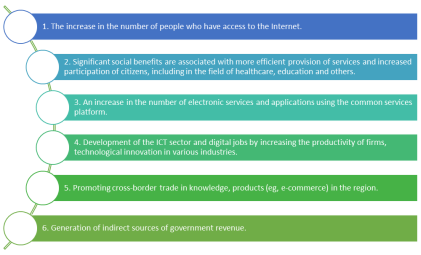This work is devoted to identifying key factors and trends in the development of the digital economy in Central Asia.
Keywords: digital economy, innovation, technology, internet, e-government
The digital and physical worlds are getting closer, bringing us into that intelligent space where connectedness will be important. Global digitalization continues to accelerate, providing convenience and sustainable growth for governments, enterprises and individuals. In the context of such digitalization, the lack of progress will lead to regression in the countries of Central Asia. Only a quantum leap will help these countries, which will ensure the search and finding of innovative solutions, the development of best practices and the creation of new competitive advantages. Studies have shown that investment in ICTs has a significant impact on the economy, which goes far beyond its main benefits.
The development of the digital economy is directly related to the level of development of information and communication technologies (ICT), which is usually estimated by the following indicators: the share of the digital economy of GDP; the size of investments in the ICT industry; Internet speed, degree of coverage of the country's territory and accessibility for use by the population; development of electronic commerce; provision of organizations with ICT specialists.
While new technologies are changing the established way of life around the world, the countries of Central Asia, unfortunately, are not preparing fast enough for new conditions. Internet access is an acute problem for some Central Asian countries — the connection quality is poor, transit is expensive, international connectivity is limited. As a result, in most countries of the region, the Internet is still a luxury. Central Asian countries in terms of Internet access are completely dependent on one direction: North-South — from Russia to Kazakhstan and further to Uzbekistan, Kyrgyzstan and Tajikistan. Therefore, the price of Internet in the region is the highest in the world, while at the same time low quality. While world prices for the Internet are about 70 cents per megabit per second (Mbps), countries in the region have to purchase the Internet at a premium of up to 3000 % [1]. One of the most famous indexes is ICT Development index, which comprises 11 indicators and describes the status and development of the ICT sector [2].
Table 1
ICT Development index 2017
|
Country |
IDI 2017 Value |
IDI 2017 Rank |
|
Kazakhstan |
6.79 |
52 |
|
Uzbekistan |
4.90 |
95 |
|
Kyrgyzstan |
4.37 |
109 |
According to the ICT Development Index (IDI), in 2017 Uzbekistan took 95th place (index 4.9) among 176 countries of the world Kazakhstan — 52nd (6.79) and Kyrgyzstan — 109th (4.37). This table shows that Kazakhstan is the undisputed leader in the region in the development of ICT. Moreover, both technologically — in terms of infrastructure, and in terms of the volume of content created, including the active development of services for business and the digitalization of public services.
In terms of the Telecommunications Infrastructure Index, Uzbekistan from the Central Asian countries is ahead of only Turkmenistan and Tajikistan and with an indicator of 0.3307. The Telecommunication Infrastructure Index (TII) is compiled on the basis of the following five indicators per 100 inhabitants: the number of Internet users and landline telephone lines, as well as subscribers: mobile communications, wireless broadband and fixed broadband networks. In terms of Internet speed Speedtest Global Index website data for September 2019, Uzbekistan ranks 116th in the ranking of 176 countries in broadband (fixed) and 129th in mobile Internet, behind Tajikistan (111th and 135th), Kyrgyzstan (83rd and 101st), Kazakhstan (68th and 97th). According to the E-Government Development Index (EGDI), which is one of the indicators in the UN E-Government 2018 study, Uzbekistan ranked 81st in the ranking, ahead of Kyrgyzstan (91st), Tajikistan (131st) and Turkmenistan (147th), and lost to Kazakhstan (39th). The “e-government development index” is the weighted average of the normalized indicators for the three main aspects of “e-government”: the volume and quality of online services, expressed as the “online service index” (OSI); the state of development of telecommunications infrastructure, or the “telecommunications infrastructure index” (TII) and internal human capital, or “human capital index” (HCI).
In 2018, according to the Global Cybersecurity Index of the International Telecommunication Union, Uzbekistan took 52nd place out of 175 countries, losing to Kazakhstan (40th place) and Russia (26th) and ahead Tajikistan (107th), Kyrgyzstan (111th), Turkmenistan (143rd). It should be noted that until recently, in 2017, Uzbekistan occupied the 93rd place in the rating for this index. The Global Cybersecurity Index measures government commitment in five areas: legal measures, technical measures, organizational measures, capacity development and international cooperation. Given the processes of globalization of the information space, the index motivates states to take measures to strengthen cybersecurity in order to minimize the growing threats to the development of ICT by cybercriminals [3].
The Central Asian region is becoming the scene of large-scale initiatives such as Digital CASA, a project of the World Bank Group to create a regional cross-border broadband telecommunication network [4].
Digital CASA aims to expand access to a more accessible Internet, attract private investment and increase the capacity of participating governments to provide digital public services in Central Asia and parts of South Asia by developing a regionally integrated digital infrastructure and enabling environment.
In accordance with the findings of the 2016 World Development Report Digital Dividends, the program is expected to lead to: increase economic growth, improved job opportunities, improved public and private services.
First participating countries:
− Kyrgyzstan ($ 50 million)
− Uzbekistan (estimated at 100–300 million US dollars)
− Dialogue continues with Kazakhstan and Tajikistan

Fig. 1. Main aspects of the project Digital CASA
An analysis of the digital potential of Central Asian countries revealed that the countries have significant resources to create a digital economy, but the development potential in different countries is quite asymmetric. This poses a risk of widening the digital divide between them. In general, there is a need to develop a digital culture in the region — at the moment, in all countries, business is a key driver of the digitalization process. Moreover, to accelerate the development of the digital economy, the paramount stage is the formation of modern and modernization of the basic ICT infrastructure. It is necessary to develop an information infrastructure, which includes a set of information centers, subsystems, data and knowledge banks, communication systems, control centers, hardware and software tools and technologies for collecting, storing, processing and transmitting information.
References:
- Roundtable: Digital Central Asia. URL: https://caa-network.org/archives/8130
- ICT Development index 2017: URL:https://www.itu.int/net4/ITU-D/idi/2017/index.html
- https://review.uz/ru/post/uzbekistan-otsifroviyvaetsya
- https://www.unescap.org/sites/default/files/The %20example %20of %20the %20Digital %20CASA %20regional %20program %2C %20World %20Bank %2C %20Russian.pdf







